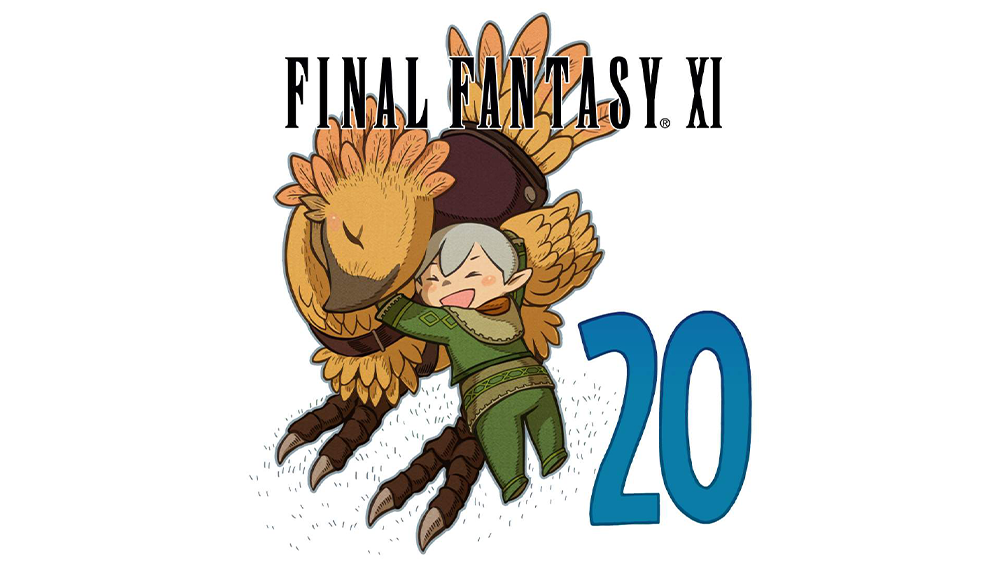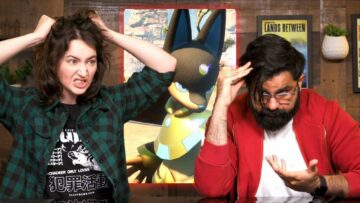Few MMORPGs last as long as Final Fantasy XI, which celebrated its 20th anniversary in May. 20 years of active service is a monumental achievement for any online game, but especially one built upon the hardcore design of pre-World of Warcraft MMOs that remains strictly subscription-based.
And yet, Final Fantasy XI shows no signs of stopping any time soon, even as Square Enix’s other MMO, the award-winning Final Fantasy XIV, continues to rise in popularity.
In fact, Final Fantasy XI’s player base has grown in the last few years, and until recently it was Square Enix’s most-profitable Final Fantasy game (a title Final Fantasy XIV now holds as of 2021). In the months leading up to the 20th anniversary celebration, Final Fantasy XI even received all-new gameplay systems like the new Master Levels for post-game players, and the ongoing “Voracious Resurgence” questline, which is the first new story content the game has seen in years.
To get more insight into Final Fantasy XI’s continued success, GameSpot interviewed Final Fantasy XI producer Akihiko Matsui and director Yoji Fujito about the game’s 20th anniversary, its enduring legacy, and the possibilities for the future of this beloved MMORPG. Translations were provided by Square Enix.
GameSpot: I’ve heard that the initial expectations were that Final Fantasy XI may only be active for a few years. Now, 20 years later, the game still has a passionate playerbase. Are you surprised the game has lasted this long? Why do you think FFXI remains so popular?
Akihiko Matsui, Producer: Thanks to our players, we were able to celebrate our 20th anniversary. I would like to take this opportunity to sincerely thank everyone at GameSpot, as well as their readers. Our game may seem rather old-fashioned and slow-paced nowadays, but perhaps many subsequent MMORPGs have evolved too systematically and are unable to offer fresh experiences despite being new, which I believe may be why players are considering Final Fantasy XI among their options. It isn’t the most user-friendly game, but we are helped by the fact that FFXI players are experts when it comes to enjoying the game.
Yoji Fujito, Director: First of all, I’m relieved to have celebrated our 20th anniversary safe and sound. The years flew by as we perpetually brainstormed our updates for the game and how to go about fulfilling our adventurers’ desire for adventure, and our 20th anniversary had arrived before we knew it. To be honest, I still can’t believe it’s been 20 years, because it feels as if we just celebrated our 10th and 15th anniversaries just the other day.
So, my reaction to being told, “It’s been 20 years!” is mostly “What? No way!” Regarding why the game has lasted this long, I believe it’s because new content and adjustments are being released on a regular basis, which have been helping in keeping the community engaged.
Speaking from personal experience, I have noticed more new players both in-game and on social media over the past couple years. Certainly some of that may be a consequence of the COVID-19 pandemic and crossover appeal with Final Fantasy XIV, but the game has seen a boost in popularity among YouTubers and Twitch streamers as well. What do you make of popular North American content creators like Maximillian Dood and Tyler “Ninja” Blevins going back to the game in recent years?
Matsui: As you’ve pointed out, the data seems to indicate the boost was a result of people staying home due to COVID-19, but we also saw an influx of Western players returning to FFXI a little before that as well. There may have been other reasons, but I believe streamers made a significant impact in that aspect.
I can only imagine what motivated these streamers to play FFXI, but if I were to guess, FFXI’s battles are slower-paced compared to other modern MMORPGs and therefore suitable for chatting while playing, and may also have been a great way for old-school players to show off their expertise to newcomers.
Part of the 20th anniversary celebration includes the new title track “We Are Vana’diel.” Can you tell us about the decision to add new title music to the game and how the song came to be?
Fujito: The development team wanted to implement something for the 20th anniversary that would have an obvious significance from a meta perspective as well. So apart from holding the limited-time anniversary event, we decided to increase the number of title tracks, something we’d previously only updated with each expansion.This I entrusted to our sound director, Naoshi Mizuta. All I’d told him at the time was, “Please compose a marching song worthy of being called ‘Vana’diel March Ver.20th,'” but the quality of the music he delivered was far beyond what I had imagined.
He apparently composed it based on the idea that Vana’diel is shaped not only by the developers but by everyone involved with FFXI, the selfsame concept that is symbolized in the name of the 20th anniversary special site, “WE ARE VANA’DIEL.” We also went with Mizuta’s suggestion to title this rendition of Vana’diel March as “We Are Vana’diel,” which couldn’t have been more appropriate for the song.
Final Fantasy XI was a groundbreaking MMO in many ways, and was even the first MMO where PC and console players could adventure together. What do you think is Final Fantasy XI’s most important contribution to the MMO space?
Matsui: I’m not aware of whether FFXI contributed anything that stood out compared to other MMORPGs. But if I had to name something, I’d say that it brought Final Fantasy to MMORPGs; in other words, it established a style of games that strongly emphasizes narrative, and includes cutscenes (dramatic scenes) as part of the experience even if they make other players wait for the game to start. We took on many other challenges as well, but it is unclear if they had any impact. In particular, I believe it’s important for developers to maintain responsibility for operations and updates, but unfortunately this style doesn’t seem to have had much traction.
Final Fantasy is known for its powerful storylines and relatable characters, and Final Fantasy XI is no exception. I am especially a fan of the Chains of Promathia and Wings of the Goddess expansions. Which storyline is your favorite?
Matsui: I like Treasures of Aht Urhgan, which allowed us to add jobs that were unique from a system perspective. We actually had a change of staff members in charge of the story starting with Treasures of Aht Urhgan which had me worried during development, but in the end they were able to create a very wonderful story and characters. My favorites are Aphmau and the Serpent Generals. Oh, and we can’t forget President Naja!
Fujito: Personally, I like Wings of the Goddess. The series of main stories about Lilisette are spectacular, of course, but I’m especially fond of the stories surrounding the past of San d’Oria, Bastok, and Windurst, which evoke nostalgia and filled in the blanks I was curious about. The music in the past areas also have a subtle melancholy to their melodies, making the album for this series the one I’ve listened to the most.
While the game has seen numerous expansions and updates that add major new features like the Trust AI party members or new combat mechanics, I have to imagine plenty of ideas were left on the cutting room floor. Can you tell us about any of the ideas wanted to include but couldn’t?
Matsui: To this day, I’d like to include tutorials and other elements that are common in modern MMORPGs but wouldn’t significantly alter FFXI itself. Before launch, we dreamed of a system that would enable users to create their own quests and missions, so that they could continue to play with new quests and missions indefinitely. As an element that might be necessary to make such an idea a reality, I also had ideas for a feature that would allow players to place objects on the field.
One of the most important parts of Final Fantasy XI’s legacy is its influence on Final Fantasy XIV. Obviously FFXI and FFXIV are two very different games, but fans often compare the two nonetheless. What is it like having two MMOs in the same franchise?
Matsui: The assumption very, very early on was that Final Fantasy XIV would inherit FFXI’s customers, after which FFXI would quietly end its role. However, the standards for MMORPGs during the launch of FFXI and FFXIV were too different, and the games ended up with very distinct styles. If FFXIV had been a straightforward upgrade to FFXI, I believe there would’ve been no qualms with terminating FFXI’s service.
Both games have large crowds of dedicated fans and are profitable, so I don’t see a problem with the current situation. At a time when few game companies are operating MMORPGs, I personally think it’s pretty awesome that we’re developing and operating three major MMORPG titles, including Dragon Quest X.
Many players look back fondly on the “Level 75-era” of the game. Have you ever considered adding “classic” servers like other long-running MMOs like World of Warcraft, or adding optional content level caps for players that want to experience Final Fantasy XI gameplay from that time?
Matsui: I’m skeptical about classic servers, especially because I don’t think they’re viable from a business standpoint.
For example, in the case of FFXI, the cost of setting up and running a classic server would require us to charge a much higher fee for it than the main service. While it’s very understandable that someone might want to take a quick look back at the experiences of the time, but the cost is just too high. As such, we hope players can continue to enjoy the current service. On the other hand, if players are looking to challenge certain content at the maximum level of the time, I believe that would be something worth considering.
Another popular MMO, Dragon Quest X, recently announced an offline version of its game. Do you think Final Fantasy XI could work as an offline version to keep it ongoing in the future? I know many players would appreciate having a way to experience the story and world in a different way.
Fujito: We understand the demand for offline versions and remakes, as we’ve received requests for them from various parts of the community. Doing so, however, would simply mean that the game would become something else entirely, and would not be a recreation of FFXI as players have envisioned it.
I myself am concerned that this will be the only title in the Final Fantasy series that cannot be enjoyed once the service inevitably comes to an end sometime in the distant future. How to preserve the game separately from the main service is a major topic that needs to be considered, but at least for now while the service is still active, I hope players will enjoy Vana’diel in its present form.
Thank you again for taking the time to speak with us!
Matsui: Thank you for this opportunity. We have had an increase and return of Western users for several years now, and that has been a tailwind for the FFXI team. It would be wonderful if you could continue to take on the role of communicating with the Western FFXI community. I would like to sincerely thank all the Western gamers who were playing alongside me back when I was playing EverQuest who showed me just how much fun MMORPGs could be.
Fujito: Thank you too, for giving us the opportunity to do this interview!
I have been working on this title for 20 years, but it feels like only a few years ago when the service started. Before I knew it, I was married and my children were in elementary school. And when I celebrated my birthday the other day, I realized that exactly 40% of my life has been involved in the development and operation of this title.
In this way, I feel as if FFXI is truly a part of myself. I’ve grown alongside FFXI and will cherish it for a long time to come. I hope you will maintain your interest in FFXI. Thank you very much.
GameSpot may get a commission from retail offers.
The products discussed here were independently chosen by our editors.
GameSpot may get a share of the revenue if you buy anything featured on our site.












